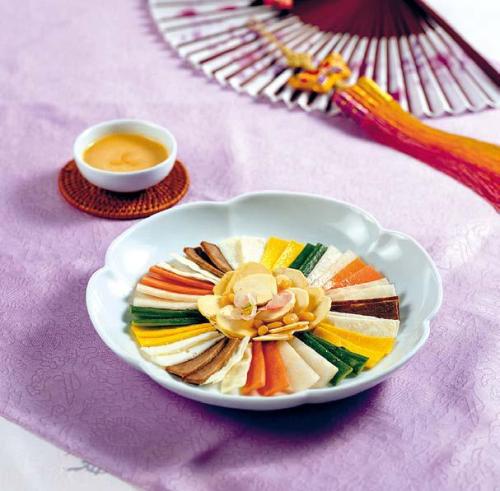Gyeojachae (assorted cold plate with mustard sauce)
By Korea HeraldPublished : Dec. 23, 2011 - 19:58

Gyeojachae is a fresh salad dish made of vegetables, the Korean pear, chestnuts and sliced pressed meat in a mustard dressing. Gyeojachae stimulates the appetite with its hot, sweet and sour taste. It is usually served as an appetizer. It should be assembled just before serving to keep its taste fresh and prevent it from becoming watery.
Ingredients
● 200g beef (brisket), 3 cups water
● fragrant seasoning : 20g green onion, 10 g garlic
● 1/2 cucumber, 1/3 carrot, 90g cabbage
● medium 1/4 pear, 1/2 cup water, 1/2 tsp sugar
● 3 chestnut, 1 egg, 1/2 pine nuts
● mustard juice: 3 tbsp fermented mustard, 1 tsp salt, 3 tbsp vinegar, 2 tbsp sugar, 3 tbsp broth
1. Clean blood of beef with cotton cloths. Wash fragrant seasoning.
2. Put the beef and water in the pot, boil it for 3 minutes. Skim off foam and residue and continue to boil for another 5 minutes. Add fragrant seasoning, lower the heat to medium and simmer for 35 minutes.
3. Take out the beef from the broth, wrap it with a cloth, press it firmly for 30 minutes. Slice it into 1.5 cm-wide, 5 cm-long and 0.3 cm-thick pieces.
4. Wash cucumber, carrot and cabbage, cut them into 5 cm-long, 1.5 cm-wide and 0.3 cm-thick pieces. Dip them in cold water.
5. Peel the pear and cut into same size as carrot, dip in sugar water. Skin the chestnuts, and slice 0.5 cm-thick, maintaining chestnut shape.
6. Remove tops of the pine nuts and wipe the nuts.
7. Pan-fry eggs for yellow/white garnish and cut it into same size as carrot.
8. Blend mustard juice.
9. Place the pressed beef, vegetables and egg garnish on a dish roundly. Put the chestnuts and pine nuts in the center, then serve with mustard juice.
Tips
● Seafood such as shrimp and abalone may be added to this dish.
● Dip the vegetables in iced water for a crisp texture.
(Adapted from the Institute of Traditional Korean Food)
Ingredients
● 200g beef (brisket), 3 cups water
● fragrant seasoning : 20g green onion, 10 g garlic
● 1/2 cucumber, 1/3 carrot, 90g cabbage
● medium 1/4 pear, 1/2 cup water, 1/2 tsp sugar
● 3 chestnut, 1 egg, 1/2 pine nuts
● mustard juice: 3 tbsp fermented mustard, 1 tsp salt, 3 tbsp vinegar, 2 tbsp sugar, 3 tbsp broth
1. Clean blood of beef with cotton cloths. Wash fragrant seasoning.
2. Put the beef and water in the pot, boil it for 3 minutes. Skim off foam and residue and continue to boil for another 5 minutes. Add fragrant seasoning, lower the heat to medium and simmer for 35 minutes.
3. Take out the beef from the broth, wrap it with a cloth, press it firmly for 30 minutes. Slice it into 1.5 cm-wide, 5 cm-long and 0.3 cm-thick pieces.
4. Wash cucumber, carrot and cabbage, cut them into 5 cm-long, 1.5 cm-wide and 0.3 cm-thick pieces. Dip them in cold water.
5. Peel the pear and cut into same size as carrot, dip in sugar water. Skin the chestnuts, and slice 0.5 cm-thick, maintaining chestnut shape.
6. Remove tops of the pine nuts and wipe the nuts.
7. Pan-fry eggs for yellow/white garnish and cut it into same size as carrot.
8. Blend mustard juice.
9. Place the pressed beef, vegetables and egg garnish on a dish roundly. Put the chestnuts and pine nuts in the center, then serve with mustard juice.
Tips
● Seafood such as shrimp and abalone may be added to this dish.
● Dip the vegetables in iced water for a crisp texture.
(Adapted from the Institute of Traditional Korean Food)
-
Articles by Korea Herald


![[Exclusive] Korean military set to ban iPhones over 'security' concerns](http://res.heraldm.com/phpwas/restmb_idxmake.php?idx=644&simg=/content/image/2024/04/23/20240423050599_0.jpg&u=20240423183955)

![[Graphic News] 77% of young Koreans still financially dependent](http://res.heraldm.com/phpwas/restmb_idxmake.php?idx=644&simg=/content/image/2024/04/22/20240422050762_0.gif&u=)




![[Pressure points] Leggings in public: Fashion statement or social faux pas?](http://res.heraldm.com/phpwas/restmb_idxmake.php?idx=644&simg=/content/image/2024/04/23/20240423050669_0.jpg&u=)









